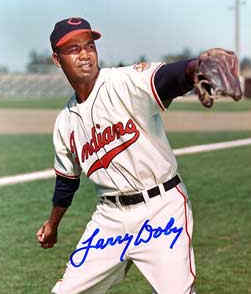Born on Dec. 13, 1923, in Camden, S.C., Doby grew up in New Jersey. He didn’t start out in life longing for a career in professional baseball. He once said that he grew up wanting to teach and coach in high school.
But in 1942, a Negro League umpire recommended to the owner of the Newark Eagles that Doby, still in high school at the time, get a tryout. “They gave me a tryout, and I made the team,” Doby said. “That’s how I got involved in Negro League Baseball.”
Doby proved he was star material early in his Negro League days. He was an All-Star second baseman whose baseball credentials might have been better than Robinson’s.
“Boy, could he play baseball,” O’Neil said. “I saw him way back as a second baseman with the Newark Eagles. This is a shocker. I get around the country a lot, and I ran into Larry quite often. I’ll miss him greatly. So many people will.”
In the mid-1940s, Doby, O’Neil and other black ballplayers had no grand dreams of taking their talent to any stage beyond the Negro Leagues.
“I never looked that far ahead, because growing up in a segregated society, you couldn’t have thought that was the way life was gonna be,” Doby once said. “There was no bright spot as far as looking at baseball until Mr. Robinson got the opportunity to play in Montreal in ’46.”
But once Robinson made it into the Major League pipeline, Negro League stars like Doby, Satchel Paige and Monte Irvin drew the attention of baseball executives in the Majors.
After Robinson made it to the big leagues in 1947, the 23-year-old Doby came into the Majors 11 weeks later. Nothing had changed, though. For he endured the same bigotry that had haunted Robinson. Restaurants and hotels across America were closed to Doby just as they were closed to Robinson. Yet baseball history seems not to have given much attention to Doby’s struggles.
The slight always rankled Doby.
“I think anybody in his right senses, particularly if they grew up in that time, would know there was no difference as far as the treatment was concerned,” he once said.
But his peers in the game did take notice, even if the public accounts didn’t tell Doby’s story as often or in much as detail as they told Robinson’s.
“Don’t forget Larry Doby,” Willie Mays once told The New York Times. Referring to white players who had helped Robinson, he added, “From what I hear, Jackie had Pee Wee Reese and Gil Hodges and Ralph Branca, but Larry didn’t have anybody.”
“He certainly endured a great deal of prejudice,” Rosen said, “and Larry handled it as well as anybody could handle it. He was a tough, hard-nosed player. It was very difficult for him. There’s no doubt about that.”
Rosen and Doby played together from 1947 to 1955, when the Indians traded Doby to the White Sox. He returned to the Indians in 1958, and he split the ’59 season between the Tigers and the White Sox, retiring afterward. He had a lifetime average of .283 with 253 homers and 970 RBIs.
Doby was a seven-time All-Star in a 13-year career and helped lead the Indians to their last World Series title in 1948, starting in center field and hitting a home run in Game 4. He was voted into the Hall of Fame by the Veterans Committee in 1998.
“He was just an outstanding player and a terrific teammate,” Rosen said. “But I always admired his play.”
His post-playing days also included coaching and front-office stints with the Sox, Indians and Montreal Expos.
He capped his baseball career by working in the Commissioner’s Office in New York.
Doby also worked in the late ’70s as director of community relations of the NBA’s New Jersey Nets and got involved in a number of inner-city youth programs.
Doby and his wife, Helyn, had five children. She died of cancer in 2001. Funeral arrangements for Doby were unknown.
“We are extremely saddened by the passing of Larry Doby,” said Bob DiBiasio, the Indians vice president/public relations. “He was a great and honorable man, and he did a tremendous amount for the game of baseball and the Cleveland Indians organization.
“He was a pioneer in the game and a pioneer of a man. He will be missed.”
